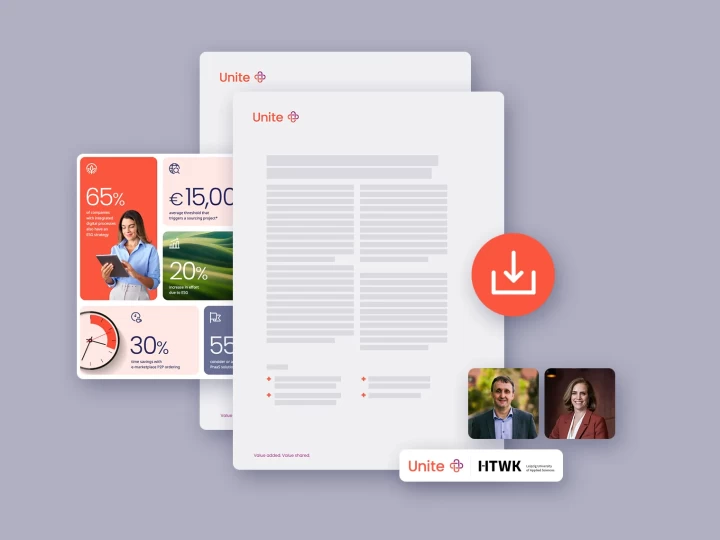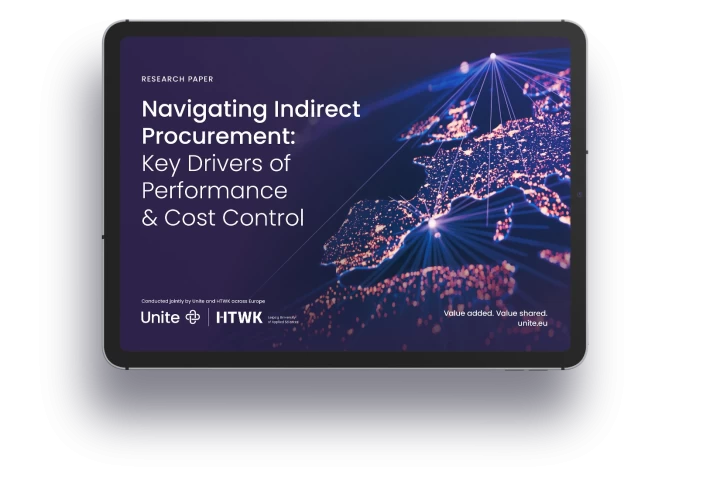27 May 2025, Leipzig, Germany – A new research paper, ‘Navigating indirect procurement: key drivers of performance and cost control’, conducted jointly by European procurement platform Unite and Leipzig University of Applied Sciences (HTWK), reveals that indirect procurement remains resource-intensive, under-digitised and misaligned with growing ESG expectations across European organisations.
Led by HTWK, the study combines independent academic research with Unite’s practical perspective on procurement transformation. Based on responses from 181 senior procurement professionals across Europe, the paper highlights the operational burden of managing indirect procurement – including sourcing, supplier management, and transactional processes – and outlines where organisations can gain efficiency, improve compliance, and reduce cost through targeted transformation.
“The study confirms what we have observed in practice for years: indirect procurement is weighed down by fragmented systems and inefficient processes,” said Prof. Dr Holger Müller, professor of supply chain management at HTWK Leipzig and lead researcher on the study. “The path forward lies in data transparency, process standardisation and digital support – particularly for companies with growing ESG and compliance responsibilities.”
Purpose: from high effort to high impact
The study aims to help procurement leaders better understand how indirect procurement is managed and where its biggest challenges lie. It evaluates performance across 5 dimensions: process efficiency, ESG integration, decision-making criteria, cost drivers and digital maturity.
While procurement teams increasingly recognise the need for structured, digitally enabled approaches, few have fully implemented them. Nearly half of all organisations surveyed manage their indirect procurement with fewer than five dedicated team members – despite overseeing tens of millions in spend and facing increasing sustainability and compliance demands. Many still use manual workflows, and 40% depend on non-task-specific tools like Excel for complex sourcing and supplier management tasks.
Digital maturity as a lever for ESG and efficiency
The research shows a strong correlation between digital process maturity and ESG execution. Companies with integrated procurement systems are significantly more likely to have a formal ESG strategy.
Key data points:
Only 15% of companies have fully digital and integrated procurement processes.
65% of digitally integrated companies also report having a defined ESG strategy.
E-marketplace usage is associated with a one-third reduction in sourcing cases, signaling a shift toward automation and streamlined processes.
Despite 65% of companies using e-marketplaces for some indirect orders, only 22% rely on them as their primary procurement channel, highlighting untapped digital potential.
Emerging solutions gaining traction
Beyond digital maturity, the study highlights growing interest in Procurement as a Service (PraaS) and AI-enabled sourcing as newer tools to enhance efficiency in indirect materials procurement. While adoption is still uneven, both approaches show potential to address effort-intensive areas and drive smarter decision-making.
“PraaS is a strategic enabler in times of permacrisis,” said Christel Constant, board member at Unite. “By shifting routine processes to specialised platforms, procurement leaders can stay agile, insight-driven, and aligned with compliance and ESG goals. With a central source of truth for indirect procurement data, companies can gain timely insights and respond faster to evolving demands.”
Study-backed focus areas for procurement leaders
Based on the data, the study identifies several priority areas where organisations can improve performance and reduce complexity in indirect procurement:
Invest in digital integration to reduce manual effort and enable real-time collaboration across sourcing, supplier management, and transactional processes.
Use digital tools to support ESG goals especially for tracking compliance and embedding sustainability into everyday decisions.
Increase visibility into effort and cost drivers using procurement data to identify inefficiencies and justify automation.
Explore emerging solutions like AI and PraaS, which show potential for reducing sourcing effort and improving agility — particularly in larger and more mature organisations.
About the study
The research was independently designed and conducted by the Supply Chain Management faculty at HTWK Leipzig. HTWK defined the research questions, developed the survey methodology, and carried out data collection and analysis. Unite supported the study by contributing industry expertise and input on relevant data dimensions.
The study draws on insights from 181 procurement professionals across Europe, 60% of whom were from the manufacturing sector. Nearly half of the respondents were based in Germany, and 73% held senior procurement roles.
The majority of respondents came from companies with over 1,000 employees, suggesting that large-scale operational needs primarily shape indirect procurement processes. However, many companies with fewer than 1,000 employees also actively participated, reflecting the diversity of procurement practices across different company sizes.
HTWK
As the largest ‘University of Applied Sciences’ in Saxony, the Leipzig University of Applied Sciences (HTWK) aims to optimally combine teaching, research and practice. More than 6,500 students study at the university in a wide range of degree programmes in the fields of engineering, business, computer science, media, social sciences and culture. The HTWK is one of the strongest research universities in Saxony - around a third of all staff are involved in externally funded research projects.
Unite
Unite (formerly Mercateo) connects the economy for sustainable business. The trusted e-procurement platform with its integrated marketplace enables effortless sourcing and purchasing for private and public sector organisations.
Bringing buyers and suppliers together for mutual benefit, Unite has established a solid foundation of fair competition and trustworthy partnerships. The platform’s scalable infrastructure supports connections, business stability and a robust supply chain.
Unite revolutionises procurement for B2B and the public sector by adding and sharing value for markets and communities. In 2022, Unite became the first platform business accredited with the Fair Tax Mark, representing the global standard for responsible tax practices.
Unite was founded as Mercateo in 2000 and is headquartered in Leipzig, Germany. It operates in 12 European countries, with over 700 employees working both in-office and remotely. In 2024, Unite achieved revenue of €448.7 million.

Download HTWK-Unite press kit
Includes press release (PDF), key findings infographic, contributor’s photo, and logo pack (HTWK & Unite).
Need more info? Contact us: communications@unite.eu

